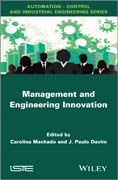
This book discusses management and engineering innovation with a particular emphasis on human resource management (HRM) and production engineering. In an innovation context, the disciplines of management and engineering are linked to promote sustainable development, seeking cultural and geographical diversity in the studies of HRM and engineering, applications that can have a particular impact on organizational communications, change processes and work practices. This connection reflects the diversity of societal and infrastructural conditions. The authors mainly analyze research on important issues that transcend the boundaries of individual academic subjects and managerial functions. They take into account interdisciplinary scholarship and commentaries that challenge the paradigms and assumptions of individual disciplines or functions, which are based on conceptual and/or empirical literature. The book is designed to increase the knowledge and effectiveness of all those involved in management and engineering innovation whether in the profit or not–for–profit sectors, or in the public or private sectors. Contents 1. We the Engineers and Them the Managers, Teresa Carla Oliveira and Joao Fontes Da Costa. 2. Strategic Capabilities for Successful Engagement in Proactive CSR in Small and Medium Enterprises: A Resource–Based View Approach, Nuttaneeya (Ann) Torugsa and Wayne O’Donohue. 3. Innovative Management Development in the Automotive Supply Industry – A Preliminary Case Study for the Development of an Innovative Approach to Innovation Management, Frank E.P. Dievernich and Kim Oliver Tokarski. 4. Innovative Product Design and Development through Online Customization, M. Reza Abdi and Vipin Khanna. 5. Struggling for Survival and Success: Can Brazil’s Defense Industry Help Foster Innovation?, Alex Lôbo Carlos and Regina Maria de Oliveira Leite. 6. Knowledge Management Fostering Innovation: Balancing Practices and Enabling Contexts, Maria Joao Santos and Raky Wane. 7. Institutional Logics Promoting and Inhibiting Innovation, Teresa Carla Trigo Oliveira and Stuart Holland. 8. HRM in SMEs in Portugal: An Innovative Proposal of Characterization, Pedro Ribeiro Novo Melo and Carolina Machado. About the Authors Carolina Machado has been teaching Human Resource Management since 1989 at the School of Economics and Management, University of Minho, Portugal, becoming Associate Professor in 2004. Her research interests include the fields of Human Resource Management, International Human Resource Management, Training and Development, Management Change and Knowledge Management. J. Paulo Davim is Aggregate Professor in the Department of Mechanical Engineering at the University of Aveiro, Portugal. He has more than 25 years of teaching and research experience in production and mechanical engineering. INDICE: Preface xi Carolina Feliciana Machado and J Paulo Davim Chapter 1 We the Engineers and Them the Managers 1 Teresa Carla Trigo Oliveira and João Fontes Da Costa 1.1 Introduction 1 1.2 Identities and values: the self and the other 4 1.3 Symmetries, asymmetries and career dynamics 7 1.4 Evolving identities and professional reference groups 9 1.5 Protean or boundaryless careers 11 1.6 Dialectics, dilemmas and career choices 14 1.7 Case study, sample and data analysis 16 1.8 Results 17 Chapter 2 Strategic Capabilities for Successful Engagement in Proactive CSR in Small and Medium Enterprises: A Resource–Based View Approach 37 Nuttaneeya (Ann) Torugsa and Wayne O’Donohue 2.1 Introduction – CSR and SMEs 38 2.2 The resource–based view approach to business strategy 41 2.3 Proactive CSR in SMEs 45 2.4 Capabilities for proactive CSR in SMEs 50 2.5 Conceptual model for successful engagement in proactive CSR in SMEs 57 2.6 Conclusion 58 2.7 Bibliography 60 Chapter 3 Innovative Management Development in the Automotive Supply Industry – A Preliminary Case Study for the Development of an Innovative Approach to Innovation Management 69 Frank EP Dievernich and Kim Oliver Tokarski 3.1 Introduction 69 3.2 Innovation 71 3.3 Case study 74 3.4 Reflection as a key to innovative management development 87 3.5 Further research issues 87 3.6 Bibliography 89 Chapter 4 Innovative Product Design and Development through Online Customization 93M Reza Abdi and Vipin Khanna 4.1 Introduction 94 4.2 Mass customization and reconfigurable products for E–PD 96 4.3 The empirical research design 101 4.4 Case of Indian office furniture sector 103 4.5 Data analysis 109 4.6 Discussions and further analysis using PESTLE 114 4.7 Conclusions 119 4.8 Bibliography 120 4.9 Appendix 123 Chapter 5 Struggling for Survival and Success: Can Brazil’s Defense Industry Help Foster Innovation? 127 Alex Lôbo Carlos and Regina Maria De Oliveira Leite 5.1 Introduction 128 5.2 Innovation as a driver for success and its common hurdles 129 5.3 Offset agreements: concepts and applications 133 5.4 How exactly is Brazil using offsets to overcome the major obstacles to innovation? 137 5.5 Some methodological considerations and empirical results 139 5.6 Conclusion 150 5.7 Bibliography 152 Chapter 6 Knowledge Management Fostering Innovation: Balancing Practices and Enabling Contexts 155 Maria João Santos and Raky Wane 6.1 Introduction 155 6.2 Knowledge management and innovation 158 6.3 KM practices fostering innovation: what practices? 161 6.4 Enabling factors/organizational context 167 6.5 Innovation performance 171 6.6 Conclusion 173 6.7 Bibliography 175 Chapter 7 Institutional Logics Promoting and Inhibiting Innovation 179 Teresa Carla Trigo Oliveira and Stuart Holland 7.1 Introduction 179 7.2 Innovation from Schumpeter to Nonaka 182 7.3 Institutional logics 184 7.4 Socio–cognitive and institutional logics 186 7.5 Big leap innovation: Fordism 187 7.6 Small step innovation: post–Fordism 188 7.7 Social and psychological contracts 192 7.8 Inertial organizational logic 195 7.9 Inertial operational logic 197 7.10 Conflicting operational logics 199 7.11 Operational logic and learning 200 7.12 Conclusion 204 7.13 Future research directions 205 7.14 Bibliography 206 7.15 Further recommended reading 212 Chapter 8 HRM in SMEs in Portugal: An Innovative Proposal of Characterization 217 Pedro Ribeiro Novo De Melo and Carolina Feliciana Machado 8.1 Introduction 217 8.2 SMEs 218 8.3 HRM 222 8.4 HRM in SMEs 225 8.5 Methodology 228 8.6 Results 230 8.7 Characterization proposal of HRM in Portuguese SMEs 234 8.8 Conclusions 239 8.9 Bibliography 239 List of Authors 243 Index 245
- ISBN: 978-1-84821-554-2
- Editorial: ISTE Ltd.
- Encuadernacion: Cartoné
- Páginas: 260
- Fecha Publicación: 25/06/2013
- Nº Volúmenes: 1
- Idioma: Inglés
